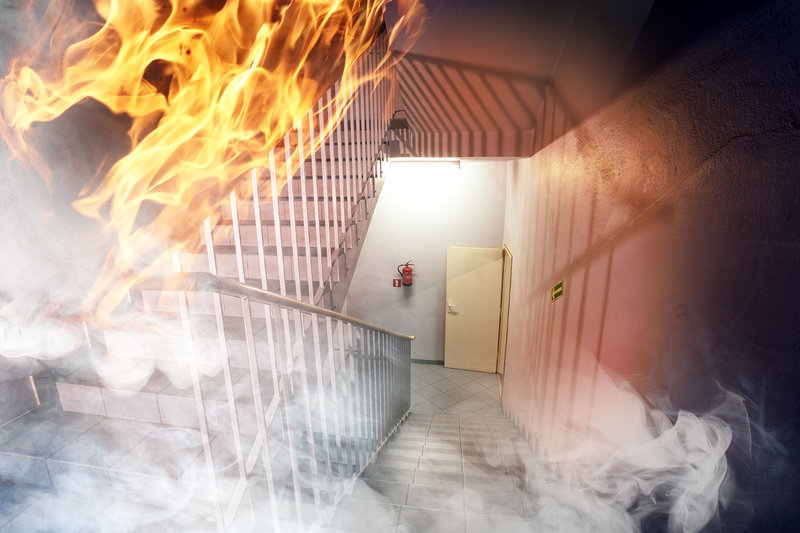
Fire doors are designed to slow down or prevent the progression of fire and smoke from one area of a commercial building to another. The National Fire Protection Agency created NFPA-80, outlining the parameters and stipulations that must be met when installing, repairing, and replacing fire doors to ensure they’ll function as designed when and if a building catches on fire.
Routine fire door inspections and drop testing is outlined in NFPA-80 and must be performed at least once a year. Fire doors in heavy-use buildings and more conscientious building and business owners may opt to have fire doors inspected more often to err on the side of caution.
Fire Door Inspections & Drop Tests Keep Building Owners in Compliance
If you are the owner of a commercial building with fire doors, or you own a business in a building where your customers and clients depend on fire doors to keep them safe in the event of a fire, take note.
- Are your fire doors inspected annually or bi-annually?
- Do you have documented paperwork or digital files on record to prove it?
- Are you unclear as to whether or not your building/business’s fire doors have been inspected in the past year?
If there is any question as to whether or not your building’s fire doors have been inspected or drop tested in the past year, look into it ASAP. In the event of a fire emergency, fire door failure can lead to injury, fatalities, and may also come back to haunt you via crippling litigation.
What To Expect During Your Fire Door Inspections and Drop Tests?
There are several steps required for inspection and drop testing.
Verify your fire door installer/inspector is qualified and verify references
The first step is to confirm your commercial fire door installer, inspector, and repair company is certified to do the work.
The Health Facilities Management Magazine recently posted an article about ill-intentioned garage door “professionals” that are actually scammers. They write, “More and more vendors are offering low- or no-cost inspections of fire and smoke doors to facilities, with the expectation that they will also be the vendor that completes the remediation and/or repairs. This has created large and sometimes inaccurate lists of deficiencies that may or may not be critical for repair.”
Verify your fire door company’s credentials and certifications, and speak with their commercial building references to ensure they perform honest, high-quality work.
General visual fire door inspections
As with any commercial door inspection, the technician begins with a visual inspection. They’ll look at the overall condition of the door, looking for visible signs of tampering, ill repair, missing or loose parts, etc.
Specifically, the technician will look for:
- Loose, damaged or misplaced bolts or mounting assembly parts
- Compliance with manufacturer’s instructions for welds and welding sites
- Fusible links are in the right locations
- That fusible links, chain/sash cables are not coated with grease, kinked, dented, misshaped or cut
- There is nothing attached to, connected to, or obstructing the fire door that isn’t a part of its designed assembly
- That the smoke detectors, and the fire door release assembly, function properly
Find and repair damaged or missing parts
Depending on the style of the fire door, the inspector will look for damaged or missing parts related to the specific door style’s design and function. This includes:
- Dented, bent, punctured, fatigued or otherwise damaged metal or slats on rolling or overhead doors
- Any signs that end locks are broken, bent, damaged, or not functioning efficiently
- Looking for dented, bent or damaged bottom bars
- Misalignment, bent or angled channels, loose bolts, etc. in the guide assembly
- Any missing, broken parts, or for drop or release arms that are tied, blocked or wedged, in the automatic closing mechanism
- Signs of poorly aligned or meshed gears of other malfunctioning or damaged parts comprising the operating mechanisms
Operational test
Some fire doors are meant to remain open at all times, except when they close automatically in response to fire or smoke alarms. Others are used day in and day out. Thus, the fire door safety inspector will test the door’s basic operation to make sure the door is properly balanced.
Any signs the door isn’t working means the parts/systems must be completely repaired and in good working order before moving forward with the drop test.
The drop test
Assuming your fire doors have been well-maintained and are in good shape, the fire door specialist will proceed with the drop test.
The drop test requires two separate steps:
- Step One: Make sure the door closes as it should
As per the door manufacturer’s instructions, the technician will start by triggering the door to close. Fire doors should shut easily, securely, and quickly – between six- and 24-seconds – from the fully open to the fully closed position.
- Step Two: Ensure the automatic closing devices reset
Once the doors have completed the first part of the drop test, the fire door safety technician will ensure the door’s automatic closing device completely resets.
Failure in either part of the test leads to a correction or repair and retesting until the door passes without any hitch. If the door continues to fail after multiple repairs or parts replacement, the fire door may need replacement.
We Can Help Keep Your Business Safe
Are your fire doors due for their annual inspection and drop test? Contact R&S Erection of Vallejo. Our commercial technicians attend regular training and they have ample experience inspecting and drop testing commercial fire doors.





